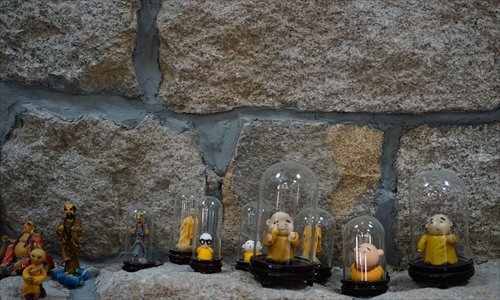Smartphone Buddha
Monks turn to social media to spread teachings

Toys of Xian'er and other characters from the Longquan Comic and Animation Group's popular short films. Photo: Li Ying/GT
Rather than making an arduous pilgrimage to a remote temple, those in search of spiritual enlightenment these days can simply log on to their WeChat or Sina Weibo to get guidance from some of the most respected Buddhist masters in the country.
Since 2009, Venerated Master Xuecheng, the abbot of the 1,500-year-old Longquan Monastery located in Beijing's Fenghuangling Nature Park, has been sharing his teachings on China's social media platforms and Twitter.
"Weibo and WeChat today are the main tools for people to communicate and interact with one another, leading to a whole new era of what many call We-media," said Xuecheng, who is also vice chairman and secretary-general of the Buddhist Association of China. "It is both a challenge and an opportunity for us to promote Buddhism to better communicate with mainstream culture."
Xuecheng currently has more than 300,000 followers on his Chinese Weibo account. Each day, he takes time to answer queries sent to him by other users.
Typical questions are like the one asked by a Net user nicknamed Andy_Linlingfei on March 21.
"I will soon graduate from college, how should I make a decision at this crossroads when faced with so many choices?"
In reply, Xuecheng wrote: "Do not simply consider the immediate advantages and disadvantages of a choice, but relate each choice to your long-term life direction."
Andy_Linlingfei, who asked that his real name not be made public, told Metropolitan that he started following Xuecheng in 2011. "One thing that makes the master stand out from other monks and masters on Weibo is that he replies questions every morning," he said.
Xuecheng also regularly posts comic strips and short videos produced by monks and volunteers associated with the Longquan Monastery. Altogether, he has Weibo accounts in eight languages, including English, French and Spanish.

Volunteers from Longquan Monastery in Beijing make animated films to explain Buddhist teachings in an amusing, digestible way that can be easily accessed on a smartphone and shared on social media. Photo: Courtesy of Longquan Monastery
New media
One of the most popular pieces of content on Xuecheng's social media accounts is a series of cartoons and short animated films featuring a naive, slightly chubby young monk by the name of Xian'er.
In each clip, usually lasting between one and three minutes long, viewers are taken into the world of Xian'er's shenanigans and his master's stern, sometimes mischievous guidance.
The short, amusing clips dispense little nuggets of wisdom to help people deal with the slings and arrows of everyday life, and to come to a better understanding of how to live more happily and harmoniously.
The intention of the animated films featuring Xian'er is to explain Buddhist precepts in understandable and relatable ways, so people could apply them in their daily lives, said Xuecheng.
"The core of Buddhism is about practicing its teachings in one's life," said Xuecheng. "It is about cultivating oneself according to Buddhist teachings, rather than merely reading about it or admiring it intellectually."
Xuecheng said that sharing the teachings of Buddha on social media was a departure from the way knowledge was traditionally shared, which required people to make pilgrimages to temples like Putian Guanghua Monastery and Chong'en Monastery in Fujian Province.
But the use of technology to communicate with the world outside the monastery was consistent with the goal of spreading the teachings of Buddha so more people could practice it in their everyday lives, he said.
Xuecheng is just one of numerous masters and monks who are using new media platforms to promote Buddha's teachings. A rudimentary search on Weibo yields dozens of accounts run by practicing Buddhists.
The most popular is perhaps Master Yancan, a monk at the Cangzhou Shuiyue Temple in Hebei Province, who has more than 35 million followers on his Weibo account. His posts share simple life philosophies, such as preaching peace and not complaining about every small thing.
Drawing monks
The skits and cartoons featuring Xian'er are made by the Longquan Comic and Animation Group, which was founded in 2011 and is composed of monks and volunteers.
One of their recent comic strips, titled "Learn to put down things and to be modest and humble," shows Xian'er refusing to give an ice cream to his friend.
Eventually, Xian'er's master intervenes, telling him: "When we are attached to things outside and can't let them go, we are actually indulging in our inner darkness, which will devour true happiness."
Yu Yueming, a 27-year-old lay Buddhist who has been living at the monastery and creating animations with the group since 2013, said that they had more than 100 volunteers.
Yu, who graduated from the Central Academy of Fine Arts in 2012, said that other volunteers included college students and professionals who specialized in traditional Chinese painting, oil painting, sculpture, ancient architecture restoration, design, photography and film.
"The youngest member involved is only 3 years old and oldest is about 70 years old," said Yu.
Last year, the group started producing micro-movies, telling the stories of local families. Each of the miniature movies has a message, such as love being more important than rationality, or how parents who keep their calm can be a positive influence to their children.
"Our resources for animating and making movies is pretty limited," said Yu. "Can you imagine, our photography studio is a little space in a cave on the mountain?"
In May 2014, the Dahe Daily in Henan Province reported that the Shaolin Temple was working with popular Taiwanese comic book author Alan Chong to make a full-length animation film, tentatively titled Kungfu Shaolin Temple.
Promoting positive energy
According to a report in Nanfang Daily in 2012, there has been a renewed enthusiasm in Buddhism among Chinese people in recent years, with more people going to temples to live for short periods like monks.
Huang Shaolong, a 27-year-old IT engineer in Beijing, visited Longquan Monastery last week. Besides making a prayer for his friend, who has an important exam upcoming, he applied to be an IT volunteer at the temple.
"I became interested in working at the temple after reading reports about many highly-educated people, who have graduated from Tsinghua or Peking universities becoming monks," said Huang.
"I would like to do things like coding or digitizing scripture or even just helping by tidying the room. Doing charity makes me feel happy."
Huang said when he was a child, his grandmother often prayed in front of Buddha for family members.
"I have very shallow understanding of Buddhism, but I think people should have a faith," he said.
These days, Huang said he tries to learn more about Buddhism through Xuecheng's blogs and Weibo account.
"I read Master Xuecheng's talks with people who are facing difficulties in their lives. It gives me positive energy and I also like the animations and comics."
Buddhist chicken soup?
An Husheng, director general of China's first online platform for Buddhism fjnet.com founded in 1996, said that he expected more and more people to turn to religion in China in the next two to three decades.
"In modern society in which the traditional relations of belonging to a neighborhood or a community have withdrawn, people turn to other channels and carriers to reconstruct the ways of relating to each other," said An, who is a graduate of Peking University, majoring in mathematics.
However, An expressed concern that using social media to share Buddhist teachings could lead people to have a fragmented and inaccurate understanding of Buddhism that would lead them astray.
Last year, there was a backlash against the abundance of widely-circulated inspirational short aphorisms and motivational stories being posted on Chinese social media, dubbed "chicken soup for the soul."
The posts, which were inspired by the popular American series of books of the same name, were criticized for being misleading and unable to stand up to critical scrutiny.
Xuecheng said that he was aware of the backlash, but he insisted that the promotion of Buddhism through social media should not be lumped in with the aforementioned kind of posts.
"There are advantages and disadvantages to the Internet and we are trying to use it for good," he said. "We hope not only to promote Buddhism but also to help cleanse the Internet."
He said that although the animations and comic strips shared on his social media accounts were entertaining and easily digestible, this did not diminish the authenticity of the teachings contained therein.
"After all, there needs to be a medium, whether it's through literature or songs or images, to explain the secrets of our heart," he said.